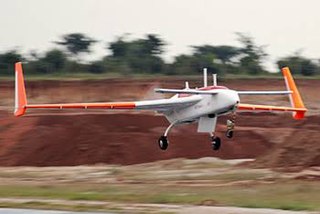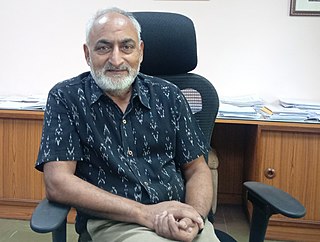Related Research Articles

The Indian Institute of Science (IISc) is a public, deemed, research university for higher education and research in science, engineering, design, and management. It is located in the southern Indian city of Bangalore, Karnataka. The institute was established in 1909 with active support from Jamsetji Tata and thus is also locally known as the "Tata Institute". It is ranked among the most prestigious academic institutions in India and has the highest citation-per-faculty among all the universities in the world. It was granted a deemed university status in 1958 and recognized as an Institute of Eminence in 2018.
Ravi B. Grover is an Indian nuclear scientist and a mechanical engineer. He is the founding vice-chancellor of the Homi Bhabha National Institute, a member of the Atomic Energy Commission, chairman of the Board of Research in Nuclear Sciences, a fellow of the Indian National Academy of Engineering, and World Academy of Art and Science. He was the president of the Indian Society of Heat and Mass Transfer for the period 2010–2013. He has been awarded Padma Shri by the Government of India in the year 2014.

An Indian passport is a passport issued by the Ministry of External Affairs of the Republic of India to Indian citizens for the purpose of international travel. It enables the bearer to travel internationally and serves as proof of Indian citizenship as per the Passports Act (1967). The Passport Seva unit of the Consular, Passport & Visa (CPV) Division of the Ministry of External Affairs functions as the issuing authority and is responsible for issuing Indian passports on application to all eligible Indian citizens. Indian passports are issued at 93 passport offices located across India and at 197 Indian diplomatic missions abroad.
Institute of National Importance (INI) is a status that may be conferred on a premier public higher education institution in India by an act of Parliament of India, an institution which "serves as a pivotal player in developing highly skilled personnel within the specified region of the country/state". Institutes of National Importance receive special recognition, higher autonomy and funding from the Government of India.

The DRDO Rustom is a medium-altitude long-endurance unmanned air vehicle (UAV) being developed by Defence Research and Development Organisation for the three services, Indian Army, Indian Navy and the Indian Air Force of the Indian Armed Forces. Rustom is derived from the NAL's LCRA developed by a team under the leadership of late Prof Rustom Damania in the 1980s. The UAV will have structural changes and a new engine.

Chitkara University is a private university located in Rajpura, Punjab, India. It offers undergraduate programs, post-graduate program and doctoral programs in fields of engineering, management, pharmacy, health sciences, nursing, hospitality, art & design and education. It was established and is managed by the Chitkara Educational Trust.

India has a publicly funded higher education system that is the third largest in the world. The main governing body at the tertiary level is the University Grants Commission, which enforces its standards, advises the government, and helps coordinate between the centre and the state. Accreditation for higher learning is overseen by 15 autonomous institutions established by the University Grants Commission (UGC).

Dr. Krishnaswamy VijayRaghavan is an emeritus professor and former director of the National Centre for Biological Sciences. On 26 March 2018, the Government of India appointed him as the principal scientific adviser to succeed Dr. R Chidamabaram. His term as Principal Scientific Adviser ended on April 2, 2022. In 2012, he was elected a fellow of The Royal Society and in April 2014 he was elected as a foreign associate of the US National Academy of Sciences. He was conferred the Padma Shri on 26 January 2013 and is also a recipient of the Infosys Prize in the life sciences category in 2009.

Mary Clubwala Jadhav MBE (1909–1975) was an Indian philanthropist.
Jaipur National University (JNU), established on 22 October 2007, is a private university located in Jaipur, the capital of Rajasthan, India. Founded through an ordinance passed by the Government of Rajasthan.

Ajita Suchitra Veera is an Indian film director, writer, illustrator, photographer, and film producer. Veera is best known for a highly visual, grand, epic, cinematic style, with unconventional narrative structures breaking form, blending reality and imagination, fantasy, dreams, scientific, philosophical, metaphysical and humanistic ideas. Her upcoming feature film "Ballad of Rustom" was in Oscar contention for Best Picture 86th Academy Awards 2014. Her earlier short film "Notes on Her" was an official entry to the Oscars in 2003. Her First Feature Film "Ballad of Rustom" which she wrote, directed and produced and also did production design, collaborated on film editing, sound design and music, was described as a "powerful cinematographic poem, epic, and faustian" by The 61st International Film Festival Mannheim, Heidelberg, Germany.
Vijayalakshmi Ravindranath is an Indian neuroscientist. She is currently a professor at the Centre for Neuroscience, Indian Institute of Science in Bangalore. She was the founder director of the National Brain Research Centre, Gurgaon (2000-9) and founder chair of the Centre for Neuroscience at Indian Institute of Science. Her main area of interest is the study of brain related disorders including neurodegenerative diseases such as Alzheimer's and Parkinson's. She serves as the founding director of the Centre for Brain Research in Bangalore.
Jitendra Nath Pande or J. N. Pande was an Indian Pulmonologist and Professor and Head of Medicine at the All India Institute of Medical Studies (AIIMS). He was working as Senior Consultant (Medicine) at Sitaram Bhartia Institute of Science & Research, New Delhi. He died on 23 May 2020 during sleep when he was home quarantined due to COVID-19 positivity during the COVID-19 pandemic in India, in New Delhi.
Jagdish Mitra Pahwa (1922-2001) was an Indian ophthalmologist, social worker and a specialist in Retinal Detachment and Photocoagulation who was reported to have conducted several charitable eye camps in India. Born on 4 July 1922 in Multan in the erstwhile British India, he graduated in medicine from the King Edward Medical University, Lahore. He was a 1969 elected fellow of the National Academy of Medical Sciences and a recipient of the NAB Rustom Merwanji Alpaiwalla Memorial Award from the National Association for the Blind (India) in 1944. The Government of India awarded him the fourth highest Indian civilian award of Padma Shri in 1973.
Mahesh Prasad Mehray (1900–1974) was an Indian ophthalmologist and the founder of Sitapur Eye Hospital, a 2500-bedded healthcare group with 32 branches across Uttar Pradesh and Uttaranchal. He was a recipient of Dr. B. C. Roy Award of the Medical Council of India, the highest Indian award in the medical category. The Government of India awarded him the fourth highest civilian honour of the Padma Shri in 1955 and followed it up with the third highest honour of the Padma Bhushan, in 1970, for his contributions to Medical science.

Rakesh Kumar Mishra is an Indian scientist specializing in genomics and epigenetics. Mishra retired as the 6th director of CSIR-Centre for Cellular and Molecular Biology (CCMB) in Hyderabad, India, on the April 30th, 2021. He is currently the Director of TIGS, Bengaluru and holds J. C. Bose Fellowship at CCMB.
Manohar Lal Munjal is an Indian acoustical engineer, honorary professor, and INSA senior scientist at the Facility for Research in Technical Acoustics (FRITA) of the Indian Institute of Science. He is known for his studies on aeroacoustics and finite wave analysis of exhaust systems. He is an elected fellow of all the three major Indian science academies viz. Indian Academy of Sciences, Indian National Science Academy, National Academy of Sciences, India as well as the Indian National Academy of Engineering. He has published three books viz. Noise and Vibration Control, Acoustics of Ducts and Mufflers With Application to Exhaust and Ventilation System Design, and IUTAM Symposium on Designing for Quietness and has contributed chapters to books edited by himself and others. The Council of Scientific and Industrial Research, the apex agency of the Government of India for scientific research, awarded him the Shanti Swarup Bhatnagar Prize for Science and Technology, one of the highest Indian science awards for his contributions to Engineering Sciences in 1986.
Ramarathnam Narasimhan is an Indian materials engineer and a professor at the Department of Mechanical Engineering of the Indian Institute of Science. He is known for his pioneering researches on fracture mechanics and is an elected fellow of the Indian Academy of Sciences, Indian National Science Academy and the Indian National Academy of Engineering. The Council of Scientific and Industrial Research, the apex agency of the Government of India for scientific research, awarded him the Shanti Swarup Bhatnagar Prize for Science and Technology, one of the highest Indian science awards for his contributions to Engineering Sciences in 1999.
Viswanathan Kumaran is an Indian chemical engineer, rheologist and a professor at the Department of Chemical Engineering of the Indian Institute of Science. He is known for his studies on stability of flow past flexible surfaces and is an elected fellow of the Indian Academy of Sciences, Indian National Science Academy and the Indian National Academy of Engineering. The Council of Scientific and Industrial Research, the apex agency of the Government of India for scientific research, awarded him the Shanti Swarup Bhatnagar Prize for Science and Technology, one of the highest Indian science awards for his contributions to Engineering Sciences in 2000. A recipient of the TWAS Prize in 2014 and the Infosys Prize 2016 in the Engineering and Computer Science category, Kumaran was listed in the Asian Scientist 100, a list of top 100 scientists from Asia, by the Asian Scientist magazine.
Rahul Pandit is an Indian condensed matter physicist, a professor of physics and a divisional chair at the Indian Institute of Science. Known for his research on phase transitions and spatiotemporal chaos and turbulence, Pandit is an elected fellow of the Indian Academy of Sciences, Indian National Science Academy and The World Academy of Sciences. The Council of Scientific and Industrial Research, the apex agency of the Government of India for scientific research, awarded him the Shanti Swarup Bhatnagar Prize for Science and Technology, one of the highest Indian science awards, for his contributions to physical sciences in 2001.
References
- ↑ "Rustom shouldn't have gone so soon". 3 October 2012.
- ↑ "India's Military and Civilian Technological Advancements: INDIA' CURRENT & FUTURE UAVs & UCAVs". Archived from the original on 27 September 2016. Retrieved 19 June 2016.
- ↑ "Archived copy" (PDF). Archived from the original (PDF) on 26 February 2013. Retrieved 19 June 2016.
{{cite web}}: CS1 maint: archived copy as title (link) - ↑ "Indian Institute of Science in Bangalore develops India's first gyrocopter". India Today. Retrieved 29 May 2018.